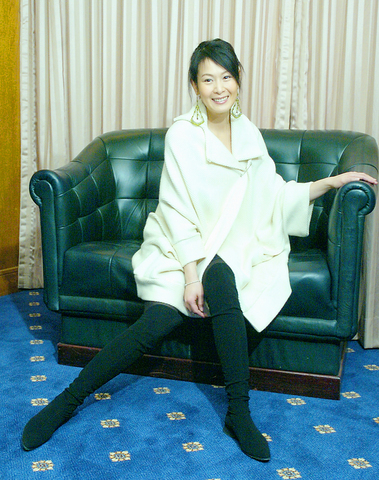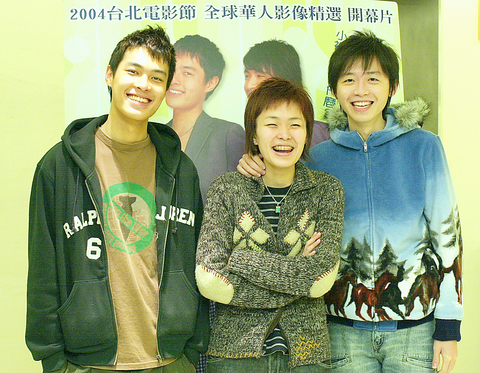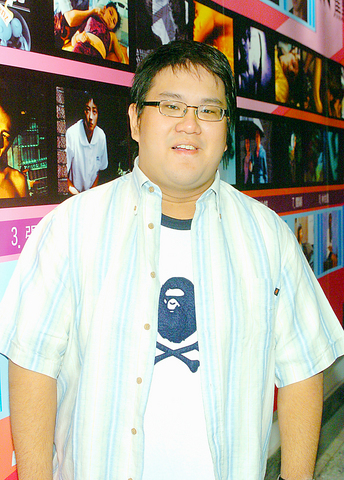Before taking a long escape for the Lunar New Year holidays, it might be a good idea to watch a movie that will calm your heart and make you more sympathetic. This weekend's new release, Nobody Knows, is a solid piece you should not miss.
Acclaimed Japanese filmmaker Hirokazu Koreeda is known for his brooding dramas with intriguing topics, such as After Life (1998), an imaginative film set in an afterlife where the deceased worry about life and death, memory and oblivion. This latest film, Nobody Knows, is based on a true story about four abandoned children who quietly lead isolated lives in an apartment in Tokyo.

PHOTOS: COURTESY OF CMPC
The film's opening looks ordinary but turns bizarre. The mom, Keiko, moves to a new house with her oldest son, Akira (Yagira Yuya). Inside the Louis Vuitton suitcases are three other kids, ages five to 10, each with different fathers whose identities are not revealed.

PHOTOS: COURTESY OF CMPC
Keiko makes the rule that the kids are not allowed to go out. Only Akira gets to leave to buy groceries and take care of the siblings. The mom is always out, working late or seeing boyfriends.
In director Koreeda's clean and -- as usual -- brooding lens, the drama of the story slowly and quietly unfolds.

PHOTO: TAIPEI TIMES
One day the mom leaves some money and a note asking Akira to take care of his siblings. The four children begin their lives about which "nobody knows."
The mom suddenly comes back on a winter night to give each kid some presents and immediately pack and leave. She promises to come back for Christmas but never does. Akira, the son, realizes that they have been abandoned and decides to hide the secret. He affectionately takes up the responsibility and maintains a family life with almost no money. In one scene, the family of four goes out for the first time to a convenience store to buy things they like.
But cruelty gradually shadows the home-alone children. Akira is, after all, a 12-year-old boy who likes baseball, computer games and hanging out with friends. After being abandoned, his dignity and faith wear off. And as for his siblings, their hope wanes, too, and they stop asking, `When is mom coming back?'
Director Koreeda uses a documentary-style method to shoot the film, and he spent a whole year living and shooting with the four non-professional child actors. The amateurs come out very naturally and even match performances by the actress who plays their mom and the Cannes' Best Actor, Yagira Yuya.
The most valuable part of the film is that while the drama is very powerful and touching, there is not one slice of a sensational shot. The prose-like narration gives more pounding to one's heart.
One naturally wonders when there will be a Taiwanese film as impressive as this Japanese film. The answer is that the audience might have to wait a few months, since most local production houses are in the beginnings of their 2005 projects.
Three Dots Entertainment (三和娛樂), the company behind the gay comedy Formula 17 (十七歲的天空), recently announced a slate of three movies for 2005. Horror film The Heirloom (宅變) will be followed by two comedies.
The Heirloom will be directed by 23-year-old Leste Chen (陳正道). Terri Kwan (關穎), who starred in Turn Left, Turn Right (向左走 向右走) and Jason Chang (張大鏞), who starred in Formula 17, will star in the film as a couple that inherits a haunted house. The shooting is scheduled to start in March.
The Extra Zone (working title), a comedy about the life of a film extra, is a project that again teams up star Tony Yang (楊佑寧) and director DJ Chen (陳映蓉) as in Formula 17, which was the second-best-sold local film in Taiwan by grossing some NT$6 million and selling internationally, including at venues in the US and Japan. The film also won a Best New Performer award for actor Tony Yang.
Three Dots' third planned film is Metrosexual 101 (搶救無趣男), written by the screenwriter of Formula 17, Rady Fu. Taiwan's genre-driven films, especially those with horror themes, will come in groups in 2005.
Su Chao-pin (蘇照彬), the screenwriter of the 2002 hit thriller Double Vision (雙瞳) and the 2003 Hong Kong horror flick Three (三更), will be making an NT$3 million horror film Silk (鬼絲).
The film has received NT$400,000 from the government's Subsidy for Film Production and Taiwan DVD maker and technology giant CMC Magnetics will be among the major investors of the film.
Scheduled to start shooting in March, Silk explores the mysterious legend that one's doom is near if one finds a string of silk on one's back. Rene Liu (劉若英) and Tony Leung Kar-fai (梁家輝) from Double Vision are among the casting choices.
Also coming in on the horror-flick train is Alice Wang (王毓雅) with her Aunt Tiger (虎姑婆), which is adapted from an ancient Chinese folk tale about a child-eating old lady, and Stan Yin's (尹祺) E Yue (惡月), whose investor is Central Motion Picture Corporation (中影, CMPC), Taiwan's oldest film studio. Both films are in post production.

June 2 to June 8 Taiwan’s woodcutters believe that if they see even one speck of red in their cooked rice, no matter how small, an accident is going to happen. Peng Chin-tian (彭錦田) swears that this has proven to be true at every stop during his decades-long career in the logging industry. Along with mining, timber harvesting was once considered the most dangerous profession in Taiwan. Not only were mishaps common during all stages of processing, it was difficult to transport the injured to get medical treatment. Many died during the arduous journey. Peng recounts some of his accidents in

“Why does Taiwan identity decline?”a group of researchers lead by University of Nevada political scientist Austin Wang (王宏恩) asked in a recent paper. After all, it is not difficult to explain the rise in Taiwanese identity after the early 1990s. But no model predicted its decline during the 2016-2018 period, they say. After testing various alternative explanations, Wang et al argue that the fall-off in Taiwanese identity during that period is related to voter hedging based on the performance of the Democratic Progressive Party (DPP). Since the DPP is perceived as the guardian of Taiwan identity, when it performs well,

A short walk beneath the dense Amazon canopy, the forest abruptly opens up. Fallen logs are rotting, the trees grow sparser and the temperature rises in places sunlight hits the ground. This is what 24 years of severe drought looks like in the world’s largest rainforest. But this patch of degraded forest, about the size of a soccer field, is a scientific experiment. Launched in 2000 by Brazilian and British scientists, Esecaflor — short for “Forest Drought Study Project” in Portuguese — set out to simulate a future in which the changing climate could deplete the Amazon of rainfall. It is

The Taiwan People’s Party (TPP) on May 18 held a rally in Taichung to mark the anniversary of President William Lai’s (賴清德) inauguration on May 20. The title of the rally could be loosely translated to “May 18 recall fraudulent goods” (518退貨ㄌㄨㄚˋ!). Unlike in English, where the terms are the same, “recall” (退貨) in this context refers to product recalls due to damaged, defective or fraudulent merchandise, not the political recalls (罷免) currently dominating the headlines. I attended the rally to determine if the impression was correct that the TPP under party Chairman Huang Kuo-Chang (黃國昌) had little of a